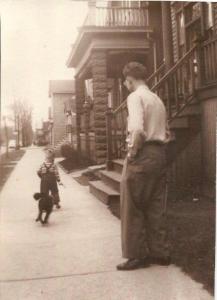Fictions are remembered, too, and they are not stored any differently in the mind from other experiences. They are experience.Siri Hustvedt, Living, Thinking, Looking: Essays
For many years I have wondered how poor and working class people in the U.S. can be so regularly persuaded to vote against their own self-interests. Election after election we see surprising results in terms of party affiliation, local and national results for elected officials, and referenda. People are voting for people who do not care about them or like them, who believe that their status in life for the electorate is ordained and deserved, and whose dim futures are unworthy of concern if elected. In the past month I have seen footage of poor people without apparent access to education or employment speaking up for Trump, Bush, and Walker. W.T.F.!
In this I am reminded of Easter in my childhood. Each year about six months before the day of celebration, my mother and sisters and I would stand in line at Junior House to get a crack at buying remnants from their spring line that was already cut and in the process of being sewn for shipment. If there was just the right weight of wool or a great bouclé, we’d snatch it up and head to the store to look for a pattern so that one of my sisters or my mom would get a new spring coat. Then shortly after Christmas, my mother would be fussing with saving money for clothes for the whole family. In March, there would be new shoes, some navy or khaki pants, and maybe a tie. In the weeks before Easter, my dad would help do the deep spring cleaning, and we’d all plough through Lent, saving what we could for the big day.
 Ostensibly, Easter was that all important day of the resurrection. Every other Sunday was but a reflection of Easter, a “little Easter” of sorts. And although this belief was true for my family and neighbors to some extent, I think it was also a day that showed others that we mattered and were good. We were not lazy and shiftless. We were not dirty. We were not poor. We had things and we had leisure. But this was a show, a pageant of sorts. Today, gay ball and pageant houses are viewed as exotic or odd because of how men come together to “represent” — to show others that they have the capacity to be someone else, someone worthy of respect. I guess I am saying that Easter was for us an opportunity to put on airs, to put on a pageant in middle class drag.
Ostensibly, Easter was that all important day of the resurrection. Every other Sunday was but a reflection of Easter, a “little Easter” of sorts. And although this belief was true for my family and neighbors to some extent, I think it was also a day that showed others that we mattered and were good. We were not lazy and shiftless. We were not dirty. We were not poor. We had things and we had leisure. But this was a show, a pageant of sorts. Today, gay ball and pageant houses are viewed as exotic or odd because of how men come together to “represent” — to show others that they have the capacity to be someone else, someone worthy of respect. I guess I am saying that Easter was for us an opportunity to put on airs, to put on a pageant in middle class drag.
In reality my parents were terribly over-worked, industrious beyond belief, and exhausted much of the time. Though they typically voted pro-union and pro-worker, they were nevertheless still buying the Calvinist perspective that our poverty was our fault and the wealth and leisure time of others was proof of their being blessed by God.
This past week NPR broadcast an interview about immigration which featured a North Korean young adult who sought and received asylum in the U.S. He spoke of his experiences of being taught to fear and hate the duplicitous and evil U.S. He showed himself to be a truly remarkable young man, clearly skilled, intelligent, and courageous. But, when asked what he thought about the 1% in the U.S., his ambivalence also showed. He said he found their insecurities remarkable. They feared losing the things that made them feel safe and special. He said he harbored no animosity toward them, after all they had worked hard for what they had. This young man, here in the U.S. for less than a decade had already drunk the Kool-aid, believing that they somehow deserved what they had, had even worked hard for it. This young man who clearly knows how to work, was duped. I wonder why this fiction is important for him and how he will eventually vote with this fiction securely stored.